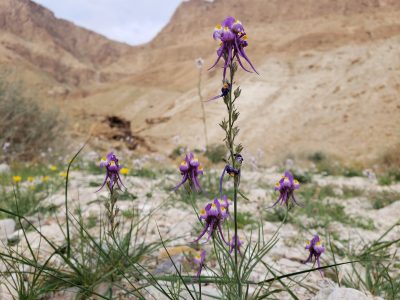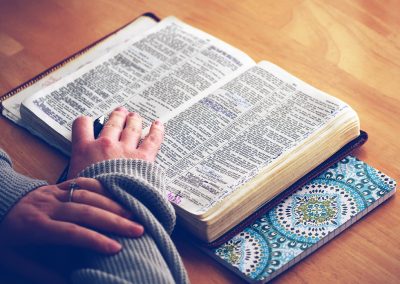
by: Rev. Rebecca J. Brimmer, International President and CEO
 This winter Israel has been very blessed with abundant rain—far more than in an average year. The rainy season was actually miserable. It was a cold, damp winter. It seemed never ending. We experienced floods, and several people died. Yet as spring arrived, we were awed to see the abundant wildflowers covering the Land. Nothing astonishes and delights us more than to see the deserts of Israel blooming. In the arid Dead Sea region, carpets of flowers sprang up. In all the years we have lived here, I only recall one other year like this. Where do the flowers come from? All those years when all we saw were barren desert scenes, the seeds were there, waiting…waiting…waiting. All it took was an amazing winter rainy season for them to burst forth with life and give us this incredible visual feast. It is hard to believe that what felt miserable to us was going to bring forth such a beautiful harvest.
This winter Israel has been very blessed with abundant rain—far more than in an average year. The rainy season was actually miserable. It was a cold, damp winter. It seemed never ending. We experienced floods, and several people died. Yet as spring arrived, we were awed to see the abundant wildflowers covering the Land. Nothing astonishes and delights us more than to see the deserts of Israel blooming. In the arid Dead Sea region, carpets of flowers sprang up. In all the years we have lived here, I only recall one other year like this. Where do the flowers come from? All those years when all we saw were barren desert scenes, the seeds were there, waiting…waiting…waiting. All it took was an amazing winter rainy season for them to burst forth with life and give us this incredible visual feast. It is hard to believe that what felt miserable to us was going to bring forth such a beautiful harvest.
During a recent time of prayer with our team, I suddenly saw this as a spiritual picture. How often have we mourned the spiritual drought in our modern world? In so many ways, our modern world has strayed far from the ways of God. The Lord reminded me of the fact that underneath the dry ground of secularism and sinful behavior lie the seeds of biblical truth. Many of our nations were referred to as Christian nations. Even now, our Judeo–Christian values are cited. Yet in many places and many ways, it appears that once-verdant soil has dried up like the cracked desert ground. In the United States, attempts have been made to squeeze God out of the public sphere by taking prayer out of schools, the Ten Commandments out of public buildings and even Christ out of Christmas. We have legalized the killing of human babies and redefined marriage. Could it be that God is using this current worldwide crisis to awaken the dried-up seeds of faith in our hearts and in our countries? Some are saying that this is a plague from God. Others have divergent opinions. Regardless, I am convinced that in the midst of this crisis, God is at work to get our attention. C.S. Lewis said, “I suggest to you that it is because God loves us that He gives us the gift of suffering. Pain is God’s megaphone to rouse a deaf world. You see, we are like blocks of stone out of which the Sculptor carves the forms of men. The blows of His chisel, which hurt us so much, are what makes us perfect.”
I would like us to consider three Scripture passages.
Many around the world are raising up prayer based on this Scripture. One of our directors here in Israel brought it up in a prayer time, asking us to read it in context. The setting is an intense spiritual time when the temple was being dedicated. The Scripture describes the glory of God filling the house. In fact, it was so heavy that the priests couldn’t even enter. “All the sons of Israel, seeing the fire come down and the glory of the LORD upon the house, bowed down on the pavement with their faces to the ground, and they worshipped and gave praise to the LORD, saying, ‘Truly He is good, truly His lovingkindness is everlasting’” (v. 3 NASB). They brought gifts to the Lord, and for seven glorious days they had a feast of dedication.
“Then the LORD appeared to Solomon by night, and said to him: ‘I have heard your prayer, and have chosen this place for Myself as a house of sacrifice’” (v. 12). Isn’t that wonderful? What a spiritual high for Solomon. The next thing the Lord said must have shocked him. “When I shut up heaven and there is no rain, or command the locusts to devour the land, or send pestilence among My people, if My people who are called by My name will humble themselves, and pray and seek My face, and turn from their wicked ways, then I will hear from heaven, and will forgive their sin and heal their land. Now My eyes will be open and My ears attentive to prayer made in this place. For now I have chosen and sanctified this house, that My name may be there forever; and My eyes and My heart will be there perpetually” (vv. 13–16, emphasis added).
In this time when the world is experiencing pestilence, God is calling to us. Will we listen? Will we obey?
 The first step is to step back from arrogant, know-it-all and self-righteous attitudes. Modern man has acted like there is no need for God. Science and knowledge have been touted as having all the answers. This pandemic has shown us our inadequacy. We need God to bring healing to our bodies and our land. The first step is humility—the recognition of our own inadequacy, an acknowledgment that we are totally dependent on God.
The first step is to step back from arrogant, know-it-all and self-righteous attitudes. Modern man has acted like there is no need for God. Science and knowledge have been touted as having all the answers. This pandemic has shown us our inadequacy. We need God to bring healing to our bodies and our land. The first step is humility—the recognition of our own inadequacy, an acknowledgment that we are totally dependent on God.
God is inviting us to communicate in prayer with Him. Now is the time to devote ourselves to prayer. Christian leaders around the world are calling for prayer. The Hebrew month of Nisan, which God calls the first month, started recently. Passover fell on the 15th of the month. On the first day of Nisan, the chief rabbi of Israel called on the Jewish world to fast and pray for God’s deliverance from this pestilence. Surely God must be glad that so many of us are talking with Him.
It is time to discern what God is saying. King David would inquire of the Lord repeatedly, and God would give Him direction. Now more than ever, we need to know what God is telling us to do. He will speak, but in order to hear, we must listen with the intent to heed His words.
“Turn from their wicked ways…” (2 Chron. 7:14). The word for repentance in Hebrew is teshuva (תשובה) and literally means “to turn.” It isn’t just saying you are sorry. It is doing a 180-degree turn and facing God. It is leaving the sin behind you. When Jesus (Yeshua) told the woman caught in adultery “go and sin no more” (John 8:11), I am sure this is what He was saying—repent and sin no more.
 “God is our refuge and strength, a very present help in trouble. Therefore we will not fear, even though the earth be removed, and though the mountains be carried into the midst of the sea” (v. 1–2). These are beautiful words of assurance for times of trouble. The psalm goes on to describe the trouble, and it sounds remarkably like the anguish the nations are experiencing today. “The nations raged, the kingdoms were moved; He uttered His voice, the earth melted” (v. 6). The psalm ends with the words: “Be still, and know that I am God; I will be exalted among the nations, I will be exalted in the earth! The LORD of hosts is with us; the God of Jacob is our refuge. Selah” (vv. 10–11).
“God is our refuge and strength, a very present help in trouble. Therefore we will not fear, even though the earth be removed, and though the mountains be carried into the midst of the sea” (v. 1–2). These are beautiful words of assurance for times of trouble. The psalm goes on to describe the trouble, and it sounds remarkably like the anguish the nations are experiencing today. “The nations raged, the kingdoms were moved; He uttered His voice, the earth melted” (v. 6). The psalm ends with the words: “Be still, and know that I am God; I will be exalted among the nations, I will be exalted in the earth! The LORD of hosts is with us; the God of Jacob is our refuge. Selah” (vv. 10–11).
Is God shouting at the nations with the megaphone of suffering C.S. Lewis described? Will the people in their solitude of social distancing “be still”? Will we seek God’s face in humility and repentance?
God makes His intentions very clear: He is looking to be exalted in all the earth. I pray that the nations will hear His voice loudly.
In this Scripture, Haggai is talking about a newly built temple. It seems there was some disappointment in that it was a poor shadow of Solomon’s Temple with all its glory. “Who is left among you who saw this temple in its former glory? And how do you see it now? In comparison with it, is this not in your eyes as nothing?” (v. 3). When Haggai refers to the glory, I am sure they remembered 2 Chronicles 7 and the account of the dedication when God’s glory was manifested so strongly.
The prophet then encourages the people to be strong, repeating the phrase three times in verse 4. He says it to the leadership (both political and religious) and to the people. Some translations say, “Be courageous.” The Hebrew word is chazak (חזק) and can mean “to strengthen, prevail, harden, be strong, become strong, be courageous, be firm, grow firm or be resolute.”
Verses 4 and 5 continue: “‘…and work; for I am with you,’ says the LORD of hosts. ‘According to the word that I covenanted with you when you came out of Egypt, so My Spirit remains among you; do not fear!’” God tells them to be strong, courageous and not to fear, specifically because there was going to be fearful, difficult and scary things coming. He tells them to work. He doesn’t want them paralyzed with fear. Let’s look at what comes next: “For thus says the LORD of hosts: ‘Once more (it is a little while) I will shake heaven and earth, the sea and dry land; and I will shake all nations, and they shall come to the Desire of All Nations, and I will fill this temple with glory,’ says the LORD of hosts. ‘The silver is Mine, and the gold is Mine,’ says the LORD of hosts. ‘The glory of this latter temple shall be greater than the former,’ says the LORD of hosts. ‘And in this place, I will give peace,’ says the LORD of hosts” (Hag. 2:6–9). Rarely are we in a situation that shakes all the nations like we are witnessing now.
 The Jewish people, like Christians, are searching their hearts and trying to understand what God is saying. The following post is being shared on Facebook. The person who posted it in English said, “It is translated from an anonymous post in Hebrew and they say that the Hebrew is beautiful like a song.”
The Jewish people, like Christians, are searching their hearts and trying to understand what God is saying. The following post is being shared on Facebook. The person who posted it in English said, “It is translated from an anonymous post in Hebrew and they say that the Hebrew is beautiful like a song.”
“We have taken nature for granted; and now we are not allowed to leave the house.
We have disrespected our parents; and now we cannot see them in person.
We have treated our teachers with contempt; and now educational institutions are closed.
We have squandered our money on things we don’t need; and now shopping malls have shut down.
We have more cars than we need; and now the roads are empty.
We have ceased to really connect with others; and now we are in isolation.
We have placed an importance on external beauty; and now our faces are covered with masks.
We can’t keep on as if there is no tomorrow, because if we do, tomorrow will not come.
We all need to pause and take account of our lives, because the gift of this virus is we have received a second chance.”
God is trying to get our attention. All three of the above Scripture passages emphasize the glory of God and the need to acknowledge and exalt Him. Let’s take this time to humble ourselves before Him, seek Him, be still in His presence, repent and turn from our sin. According to 2 Chronicles 7:14, these are the prerequisites for God to heal our land.
The heart of God longs for the nations to know that He is God. The seeds of faith may be buried under dried-up, desert-like hearts, but they remain. May the discomfort of our times be like the winter rains which caused the desert to bloom. May faith in God spring forth. May He be known in all the earth. The prophet Habakkuk said, “For the earth will be filled with the knowledge of the glory of the LORD, as the waters cover the sea” (Hab. 2:14).
Photo Credit: Click on photo to see photo credit
Lewis, C.S. The Problem of Pain. New York, NY: Touchstone, 1996. Blue Letter Bible
“Chazak.” Blue Letter Bible. https://www.blueletterbible.org/lang/lexicon/lexicon.cfm?t=kjv&strongs=h2388
“Teshuva.” Blue Letter Bible. https://www.blueletterbible.org/lang/lexicon/lexicon.cfm?t=kjv&strongs=h8666
All logos and trademarks in this site are property of their respective owner. All other materials are property of Bridges for Peace. Copyright © 2025.
Website Site Design by J-Town Internet Services Ltd. - Based in Jerusalem and Serving the World.